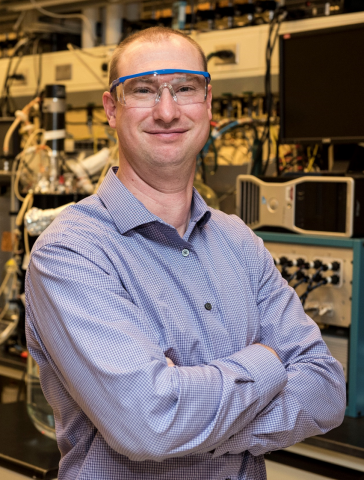Dr. Paul Piehowski is the Proteomics team leader for PNNL’s Environmental and Molecular Sciences Division and the Environmental Molecular Sciences Laboratory (EMSL) user program. Piehowski is an analytical chemist whose research is focused on the application of mass spectrometry to biological...
Filter results
Category
- Scientific Discovery (73)
- Biology (51)
- Human Health (16)
- Earth System Science (13)
- Integrative Omics (13)
- Computational Research (12)
- Microbiome Science (12)
- Chemistry (7)
- National Security (7)
- Data Analytics & Machine Learning (6)
- Computing & Analytics (5)
- Computational Mathematics & Statistics (3)
- Energy Resiliency (3)
- Chemical & Biological Signatures Science (2)
- Renewable Energy (2)
- Weapons of Mass Effect (2)
- Coastal Science (1)
- Data Analytics & Machine Learning (1)
- Ecosystem Science (1)
- Energy Efficiency (1)
- Energy Storage (1)
- Plant Science (1)
- Solar Energy (1)
Tags
- Predictive Phenomics (11)
- Mass Spectrometry (9)
- Multi-Omics (8)
- Virology (7)
- Omics-LHV Project (6)
- Differential Expression Analysis (5)
- Gene expression profile data (5)
- Immune Response (5)
- Time Sampled Measurement Datasets (5)
- Autoimmunity (4)
- Biomarkers (4)
- Homo sapiens (4)
- Mass spectrometry data (4)
- Molecular Profiling (4)
- Omics (4)
- Synthetic (4)
- Type 1 Diabetes (4)
- Machine Learning (3)
- Mass spectrometry-based Omics (3)
- Mus musculus (3)
- Proteomics (3)
- Synthetic Biology (3)
- Biological and Environmental Research (2)
- Ebola (2)
- Human Interferon (2)
- Influenza A (2)
- MERS-CoV (2)
- PerCon SFA (2)
- Predictive Modeling (2)
- West Nile virus (2)
Showing 76 - 90 of 152
Person
Person
Sara Gosline received BA in Computer Science from Columbia University and spent two years working in software before returning to graduate school full time. She received her Masters and PhD in Computer Science from McGill University with a specialty in Bioinformatics and then moved to the...
Category
OSU-PNNL Superfund Research Program Center is part of the Superfund Research Program (SRP) at Oregon State University, directed by Dr. Robyn Tanguay, bringing together a multidisciplinary team of experts with extensive experience in polycyclic aromatic hydrocarbons (PAHs) research. Using state-of...
Category
Datasets
3
Person
Placeholder
Person
Placeholder
Person
Placeholder
Last updated on 2024-02-11T22:41:43+00:00 by LN Anderson PNNL DataHub NIAID Program Project: Modeling Host Responses to Understand Severe Human Virus Infections, Multi-Omic Viral Dataset Catalog Collection Background The National Institute of Allergy and Infectious Diseases (NIAID) "Modeling Host...
Category
Datasets
45
Person
Dr. Katrina Waters is the division director for Biological Sciences at the Pacific Northwest National Laboratory. Waters has a Ph.D. in biochemistry and more than 15 years of experience in microarray and proteomics data analysis. Her research interests are focused on the integration of genomics...
Category
Person
Yanyan Cheng is a hydrologist and land surface modeler working on complex energy-water-land dynamics. She is currently a Postdoc at the Pacific Northwest National Laboratory (PNNL) in the Atmospheric Sciences and Global Change division. She earned a PhD in hydrology and water resources engineering...
Person
Washington State University Distinguished Graduate Research Program Program: Chemical Engineering WSU-PNNL Advisor: Aaron Wright
Person
Earth Scientist Emily Graham is an quantitative ecosystem ecologist in the Biological Sciences Group at PNNL and is part of the Ecosystem Science Team. She is co-principal investigator of the Subsurface Biogeochemical Research Science Focus Area (SFA) and a key member of PNNL’s soil microbiome SFA...
Category
Person
Dr. Bernstein is an Associate Professor in UiT's Arctic Centre for Sustainable Energy (ARC). He specializes in genome-enabled bioengineering with microbes and microbial communities. His research is at the juxtaposition of biotechnology and microbial ecology as applied to the fields of sustainable...
Category
Person
Colin works in microbial ecology, focusing on informatics and visualization. Education: BS - Biology and Informatics - Juniata College
Category
Actionable climate science entails the provision of local-to-regional scale climate information to support decision-making regarding climate impacts, adaptation and mitigation. Despite advances in theories, observations, climate modeling techniques, and high performance computing, large...
Datasets
1
Person
Lu Dong got her PhD degree at the Institute of Atmospheric Physics (IAP), Chinese Academy of Sciences in June 2015 under her Ph.D advisor Dr. Tianjun Zhou. During her PhD career, she mainly focused on the long-term change of sea surface temperatures in both the Indian and Pacific Oceans and compared...















